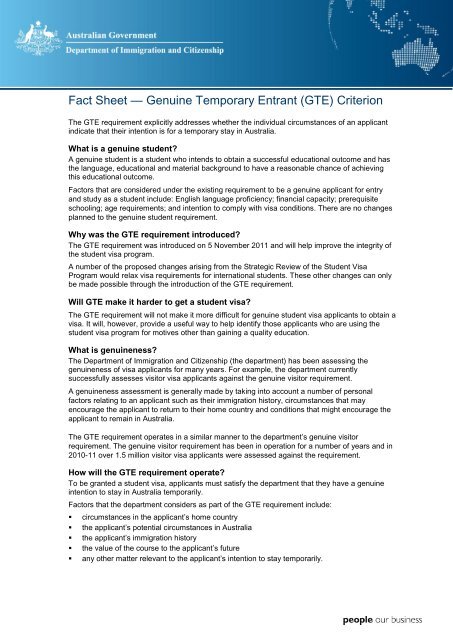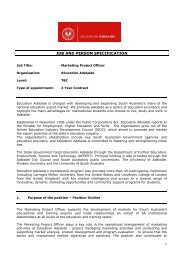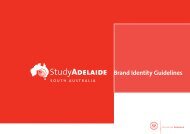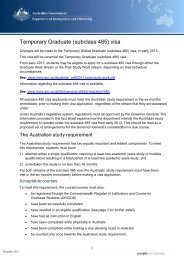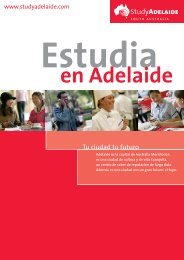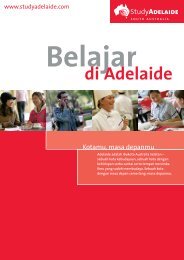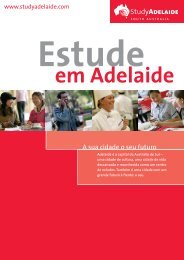Fact Sheet — Genuine Temporary Entrant (GTE ... - Study Adelaide
Fact Sheet — Genuine Temporary Entrant (GTE ... - Study Adelaide
Fact Sheet — Genuine Temporary Entrant (GTE ... - Study Adelaide
Create successful ePaper yourself
Turn your PDF publications into a flip-book with our unique Google optimized e-Paper software.
<strong>Fact</strong> <strong>Sheet</strong> — <strong>Genuine</strong> <strong>Temporary</strong> <strong>Entrant</strong> (<strong>GTE</strong>) CriterionThe <strong>GTE</strong> requirement explicitly addresses whether the individual circumstances of an applicantindicate that their intention is for a temporary stay in Australia.What is a genuine student?A genuine student is a student who intends to obtain a successful educational outcome and hasthe language, educational and material background to have a reasonable chance of achievingthis educational outcome.<strong>Fact</strong>ors that are considered under the existing requirement to be a genuine applicant for entryand study as a student include: English language proficiency; financial capacity; prerequisiteschooling; age requirements; and intention to comply with visa conditions. There are no changesplanned to the genuine student requirement.Why was the <strong>GTE</strong> requirement introduced?The <strong>GTE</strong> requirement was introduced on 5 November 2011 and will help improve the integrity ofthe student visa program.A number of the proposed changes arising from the Strategic Review of the Student VisaProgram would relax visa requirements for international students. These other changes can onlybe made possible through the introduction of the <strong>GTE</strong> requirement.Will <strong>GTE</strong> make it harder to get a student visa?The <strong>GTE</strong> requirement will not make it more difficult for genuine student visa applicants to obtain avisa. It will, however, provide a useful way to help identify those applicants who are using thestudent visa program for motives other than gaining a quality education.What is genuineness?The Department of Immigration and Citizenship (the department) has been assessing thegenuineness of visa applicants for many years. For example, the department currentlysuccessfully assesses visitor visa applicants against the genuine visitor requirement.A genuineness assessment is generally made by taking into account a number of personalfactors relating to an applicant such as their immigration history, circumstances that mayencourage the applicant to return to their home country and conditions that might encourage theapplicant to remain in Australia.The <strong>GTE</strong> requirement operates in a similar manner to the department’s genuine visitorrequirement. The genuine visitor requirement has been in operation for a number of years and in2010-11 over 1.5 million visitor visa applicants were assessed against the requirement.How will the <strong>GTE</strong> requirement operate?To be granted a student visa, applicants must satisfy the department that they have a genuineintention to stay in Australia temporarily.<strong>Fact</strong>ors that the department considers as part of the <strong>GTE</strong> requirement include:• circumstances in the applicant’s home country• the applicant’s potential circumstances in Australia• the applicant’s immigration history• the value of the course to the applicant’s future• any other matter relevant to the applicant’s intention to stay temporarily.
Which visas does the <strong>GTE</strong> requirement apply to?The <strong>GTE</strong> requirement applies to all student visa subclasses.My plan is to study in Australia and then I hope to apply for a permanent visa through theGeneral Skilled Migration (GSM) program upon completion of my studies. Will my studentvisa application be refused under the <strong>GTE</strong> requirement?The <strong>GTE</strong> is not designed to exclude those students who, after studying in Australia, go on todevelop the skills required by the Australian labour market and go on to obtain permanentresidency.While many overseas students make a decision to apply for permanent residence uponcompleting their studies, this is an entirely separate process and there is no guarantee that, onthe basis of having held a student visa, a person will meet the requirements to be grantedpermanent residence. Students should not make educational choices solely on the basis ofhoping to achieve a particular migration outcome, as the GSM program will continue to changeand adapt to Australia’s economic needs.Examples where the proposed <strong>GTE</strong> requirement would likely be met (subject to otheraspects of their individual circumstances)• A student visa holder has been in Australia for several years during which time he or shecomplied with their visa conditions and successfully completed high school and a diplomacourse. The student is now seeking to further their education by pursuing a bachelor’sdegree.• An applicant who has just completed a bachelor degree overseas and now wants to completea master’s degree in Australia in a related field. The applicant has a relatively good standardof living in their home country and is able to explain during interview how the course willbenefit them in the future.Examples where the proposed <strong>GTE</strong> requirement would likely not be satisfied (subject toother aspects of their individual circumstances)• An applicant undertaking a series of short, inexpensive courses, which the decision makerbelieves are only being undertaken in order to prolong the person’s stay in Australia forexample, where a course is structured to include only short term periods of study and themaximum allowed break in between study periods.• A student visa holder who has been in Australia for extensive periods of time either withouthaving successfully completed a qualification, or who has moved education providers onnumerous occasions and has failed to finish a course of study, without a reasonableexplanation for this.• An applicant who has a history of visa refusal, or non-compliance with immigrationrequirements in another country.• An applicant who has a relatively low standard of living in their home country, has not studiedin the ten years since completing high school and intends to study a course that would notsignificantly increase the applicant's employability upon return to their home country.Contacting the DepartmentFor additional information about your visa status, visit VEVO at: www.immi.gov.au/managingaustralias-borders/compliance/working-legally/evo-for-visa-holders.htmFor more information about student visas, or any other immigration matters, contact theDepartment’s hotline on 131 881 or visit www.immi.gov.au2


